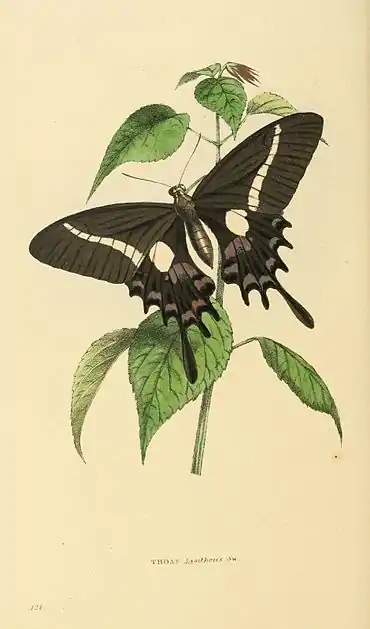THOAS Lysithous.

THOAS Lysithous,
Lysithous Butterfly.
Sub-fam. Papilionæ. Genus, Papilio. Sw. Sub-genus Thoas. Nob.
Sub-Generic Character.
Posterior wings terminating in spatulate or obtuse tails; the margins deeply scoloped; Larva smooth; Pupa braced, with the head directed upwards.
Typical Sections.
| 1. Wings with macular yellow bands. | Pap. Thoas. Auct. |
| 2. Wings with entire white bands, the posterior spotted with crimson. |
Agavius. |
| 3. Wings black, varied with emerald green bands or dots; tails short, obtuse. |
Paris. |
| 4. Tails obsolete. | Evander. |
| 5. Tails short, acute. | Androgeus. |
Specific Character.
Wings uniform black; anterior with a white band; posterior dentated and tailed, margined by red lunules; the disk white, bordered behind by 4-5 red spots.
Papilio Lisithous. Ency. Meth. 1. p. 73, no. 136.
We discovered this imposing species in the interior of Brazil, in 1814, long before it was made known in France by the specific name we have adopted. It is confined to the southern provinces; for we never met with it north of the Rio St. Francesco. Although greatly resembling Thoas Agavus and Harrisianus, (Z. Ill. 1 Series, pl. 109) it is at once distinguished by the longer and more acute dentations of the inferior wings. The under side shews no material difference from the upper. To the second type of this subgenus belongs also Ascarius L. Polybius Sw. (Z. I. 1 Series, pl. 137), and Tros. Fab. while Dardanus F. probably connects this American group with the third or Paris type, whose geographic range is confined to Asia.
In the fourth form (Evander), representing the Heliconian type, the tails are obsolete, but they begin to appear again in the fifth, and thus complete the circle of the sub-genus Thoas. By studying this natural series, the Entomologist will discover a most beautiful set of analogies between the genera Papilio and Amphrisius.